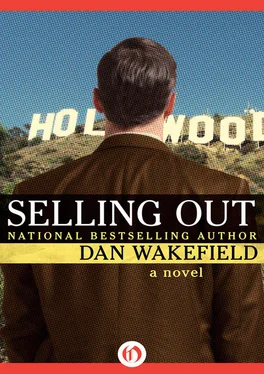Ned’s girlfriend matched the house.
She wasn’t Spanish, but she was elegant and intellectual and, as opposed to the Hollywood type of woman, she was very Eastern. In fact, she was Far Eastern. From Thailand. Kim was small, with delicate features, and certainly young, early thirties, yet she had such assurance, such presence, she gave an impression of stature. Perry feared at first she might be aloof and formal, but in moments she had him laughing with her, relaxed.
She not only conveyed an enthusiasm but an understanding of his script; she was in the same business herself, a film editor. It was hard to imagine a more appropriate mate for Ned Gurney—surely not the former wife, whoever she was, who common gossip said he split up with back in New York.
Archer Mellis made a brief appearance, just for a glass of wine, with a girlfriend; she looked like the one he’d taken to Spoleto with Perry and Jane, but instead was fresh out of Yale Law School and working as an attorney in one of the prestigious entertainment law firms out here.
Kenton Spires came with his chatterbox wife, Alicia, who kept interrupting people to complain of the lack of culture in L.A., and how hideously she missed Bloomingdale’s. When Alton Saxby arrived Perry was immediately curious to see if the casting director had brought some young sexpot he had plucked from the ranks of aspiring actresses, but instead he came arm in arm with a distinguished-looking gentleman who was a successful set designer.
Perry had assumed that since the party was to celebrate casting the leads of the show, Melinda Margulies and Hal Thaxter would be there, but Ned explained that he didn’t think it wise to socialize with actors when you were working in a show with them.
“You mean they’re too—uh, emotional?” Perry asked.
“They’re too human,” Ned said with a smile. “Worse still, they’re artists. They want to tell you how it should all be done. As a writer, you have to be specially on guard. They’ll have you rewriting every line.”
“Oh, thanks!” Perry said, storing up this new bit of show biz lore and wanting automatically to share it with Jane.
Evidently it was all right to socialize with actors and actresses when you weren’t working on a show with them, since one was there as a guest.
Perry did a double take when he saw her, not only because she was a striking-looking woman, but she also seemed familiar. He might have seen her on commercials, or minor roles in TV movies. She had short blond hair that glistened like a helmet, and tan, well-muscled legs, like a dancer. Her name was Liz Caddigan, and Perry found himself sitting next to her on a step of the courtyard terrace.
He declared to her, almost compulsively, that his wife was in Vermont, she’d be back tomorrow, and he missed her very much. He could feel himself blushing when he finished, and wondered if he sounded like a rube. Liz smiled and said she understood; the man she lived with was doing a play in New York, and she had to be in California for the filming of a TV miniseries.
There was some kind of wonderful curry for dinner, served buffet-style, and a young man in a red vest poured a nice white wine for everyone. Perry and Liz had something in common—absent lovers—so they struck up a friendly conversation. They enjoyed each other’s company.
Later on, Alton Saxby said he and his companion were going to catch a nightclub act of a singer who was a friend of theirs, and asked if anyone would like to join them. Liz said she had to be home early, and Perry offered to drop her off. She had mentioned she was staying in an actress friend’s furnished apartment in West Hollywood, not far from the Marmont.
When Perry stopped in front of her apartment building, Liz invited him in for coffee.
Why not?
There was cognac, too, if he wanted. He hesitated, then said no, thanks, just the coffee, black would be fine. He already had enough wine in him, and besides, the idea of a drink gave the casual occasion a little more intimacy, or the possibility of it. He wanted to be able to tell Jane all about it, and “she invited me in for coffee” seemed more accurately innocent than “a drink.” He started to sit on the roomy couch, then realized Liz might sit there too, so he chose a chair across from it with a low coffee table in between. He knew he was being compulsively proper, laughably so, yet this was the first time in more than five years he had sat alone in a room with another woman than Jane, with the exception of Rachel Cohen or some student or faculty colleague.
His ears felt hot, and he wondered if that meant Jane was listening, through some psychic transcontinental transmission. If she was, he had nothing to feel guilty about. Liz came in with the coffee and sat on the couch, and Perry told her how wonderful his wife was, while she in turn sang the praises of her own man back in New York. She slipped off her high-heeled sandals and tucked her long legs up on the couch, simply getting comfortable. She smoothed her short skirt down as far as it would go, yet Perry couldn’t help noticing what looked like a tendon in her muscular thigh. It seemed to be pulsing or throbbing, and for some reason fascinated him. He looked away, and spoke even more extravagantly of Jane.
A window was open, and there was a scent of impending rain. It seemed as if Perry’s sense of smell had sharpened, as if there were odors, aromas, everywhere, that windows and doors were perpetually open—that everything was open, like the land itself, the vast spaces, connected by freeways. Free ways. Ways of freedom. Perry shifted in his chair.
“It must be hard,” he said. “I mean, having to spend so much time on opposite coasts, you and Jeffrey. It must mean a lot of trust.”
“Mmmm,” Liz nodded. “Also, we don’t ask questions.”
She uncurled one leg, raising the foot, staring at the toes.
“That’s the only way it can work,” she explained, lowering her leg again, curling it back underneath her.
“Of course,” Perry said.
He set down his coffee cup, trying not to let it make a rattling noise on the saucer and only partially succeeding. He realized now he could walk a few steps to that couch and spend the rest of the night with this lovely, appealing woman. It was something he had never even imagined since the day he met Jane.
Would it matter, if it happened? Would it “count” if a man and woman made love to each other on one side of the continent while the man and woman they really loved were clear across the map on the edge of that other ocean? Did the barrier of continental distance, the difference of miles and hours, serve as a shield against the shattering of vows? Could fidelity bend instead of break in an arc of such enormous separation? Maybe there were different natural laws in operation in such cases; like gravity being suspended in space, perhaps fidelity was suspended in the warp of bi-coastal separation.
That was a comforting, a light-headed thought, but maybe it was only like an optical illusion, maybe there was something that caught up with you later, some phenomenon like “sex lag,” in which what you did seemed all right at the time but three hours later boomeranged back and wiped you out, leaving you drained, disoriented, unable to sleep, groggy and aching.
Perry drank down the last of his coffee and stood up.
Liz uncurled from the couch.
Perry could see the two of them in his mind, like actors on a stage. It reminded him of one of those improvisational theater evenings, where the drama could move to all kinds of different endings, depending on the next gesture or the next line.
“As soon as Jane gets back, we’ll get together,” Perry said.
“I can’t wait to meet her,” Liz said. “And when Jeffrey comes out, we’ll all do the town.”
Читать дальше












